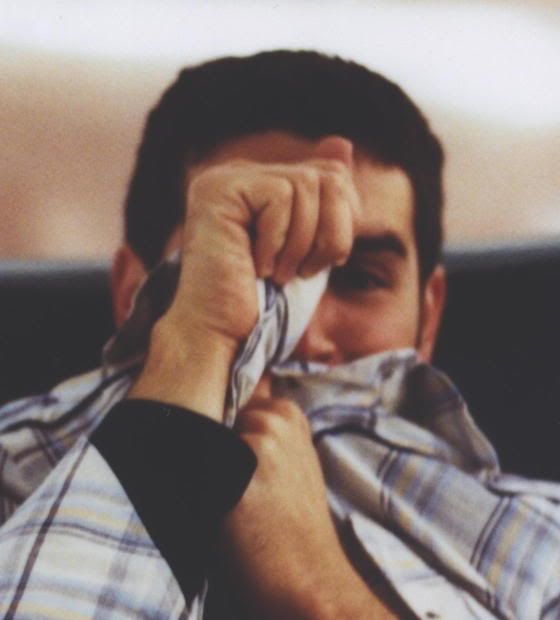Friday, January 27, 2006
self-effacement
“What do you want the most?”
“What do you mean, like, physically? Spiritually?”
He laughed, “What’s the difference?”
I didn’t laugh back. “Well, the first is what I really want, and the second is what I want to want.”
“Whichever. What do you want the most?”
“I guess what I really want is peace. To stop feeling at war with myself.”
“And what do you think that will take?”
“Oh, surrender, I guess.” I kicked a swath of pebbles out ahead of me as I walked, adding hastily, “That’s the church answer, anyway.”
He stopped to examine the bamboo around us. “Did you know that bamboo shoots can grow a foot taller every day? It’s amazing, isn’t it? Straight up into the sky.”
“I wish I were that desperate.”
That is a piece of a conversation in the story that I brought to Dr. Troy to read during our first conference this semester. She said she liked it, "Good fiction is the careful compilation of tiny surprises." But she never says anything negative, so it's hard to tell.
Then she looked hard at me and asked if I was doing okay. I said yes, not to worry. Because I am doing quite well, more or less. I asked for her advice on how to weave ideological beliefs into a story without sullying the narrative, and she brought down a novel she had written in which she had incorporated the writings of Simone Weil, a 20th century French Jewish-born Catholic mystic.
I was so impressed with what I heard that I went to the library and checked out some of Weil's books. This is the excerpt that Dr. Troy quoted. I think it's beautiful, and perfectly resonant with my present mood.
I cannot conceive the necessity for God to love me, when I feel so clearly that even with human beings affection for me can only be a mistake. But I can easily imagine that he loves that perspective of creation which can only be seen from the point where I am. But I act as a screen. I must withdraw so that he may see it.
I must withdraw so that God may make contact with the beings whom chance places in my path and whom he loves. It is tactless for me to be there. It is as though I were placed between two lovers or two friends. I am not the maiden who awaits her betrothed, but the unwelcome third who is with two betrothed lovers and ought to go away so that they can really be together.
If only I knew how to disappear, there would be a perfect love between God and the earth I tread, the sea I hear....
What do the energy, the gifts, etc., which are in me matter? I always have enough of them to disappear.
May I disappear in order that those things that I see may become perfect in their beauty from the very fact that they are no longer things that I see.
I do not in the least wish that this created world should fade from my view, but I do wish that it should no longer be shown to me in person. To me it cannot tell its secret which is too high. If I go, then the creator and the creature will exchange their secrets.
To see a landscape as it is when I am not there...
When I am in any place, I disturb the silence of heaven and earth by my breathing and the beating of my heart.--Simone Weil, Gravity and Grace
perpetual diversion from the world around us. But diversion is only a
very scant avoidance of the things we deal with everyday. Consequently
it is very difficult for us to compromise G-d and integration into
our world. But life is not a painting, you cannot peruse it when you will
and simply turn away when it pleases you no more. And also this
society is steeped in the Puritan tradition, but, if it were all said and
done now, I think all we would have to say concerning virtue is that we
abstained from everything. Sure we destroy each other through our
actions and words, destroy our minds with illusions and unrequited
desires, but at least we've abstained. It is the voice of the Stoics who say we should resign to some unseen fate and that we should hate the body and anything that should make us happy. I'm reading Rousseau's La Nouvelle Heloise now and Rousseau, I think never fully settled the dilemna between reason and passion. There is no struggle, we are our gods and our monsters. Anyway, I know that sounds hedonistic but ultimately, we are dealing with human will against human will, the forces of nature, and our selves. It is the voice of the anti-Christ that says don't live, don't see, die continually and wait for the Messiah to fix everything.
<< Home

